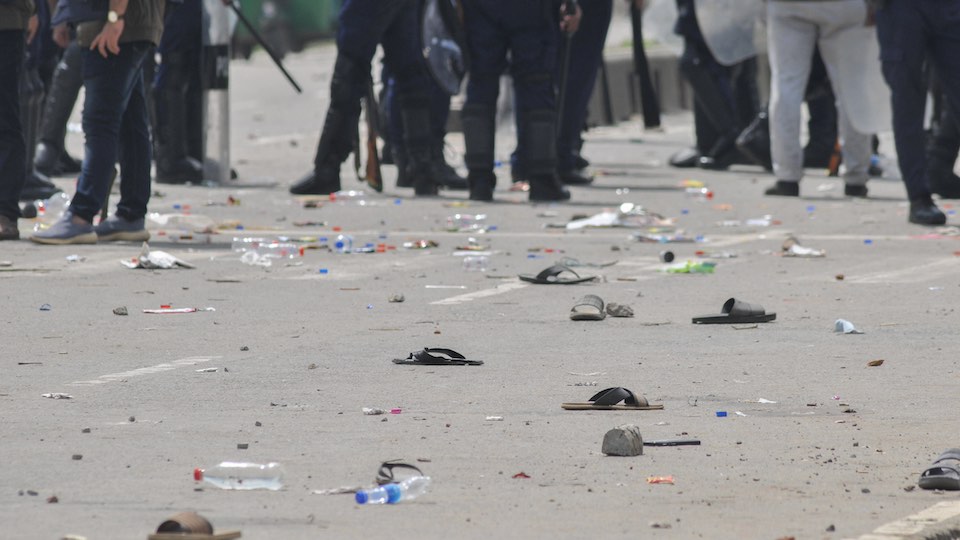Protests in Bangladesh prompt internet shutdown

The internet hasn’t worked for days in Bangladesh as the government has imposed an ongoing shutdown. The blackout comes amidst countrywide protests against the reintroduction of a controversial quota system for government jobs. In the past week there have been violent clashes between protesters, paramilitary groups and security forces.
As the internet monitoring group NetBlocks reports, the countrywide shutdown first went into effect on July 18. Restrictions have reportedly been imposed on both fixed-line internet connections and mobile networks, and continue to persist as of July 23.
In the days before the full blackout began, the government had limited access to Facebook and WhatsApp. These restrictions were followed by a shutdown of the mobile internet.
Babu Ram Pant of the human rights organization Amnesty International criticized the “arbitrary imposition” of an internet shutdown that restricts both freedom of expression and freedom of assembly. “It is reckless to impede access to information during what has been a week of escalating violence,” said Pant, noting that shutdowns put people’s safety at risk.
Protests since July 1
The protests at universities in Bangladesh began on July 1. In the past week there have been violent clashes between demonstrators and security forces. More than 140 people have reportedly been killed. Police say they have arrested more than 500 people. On Friday a curfew was imposed.
The protests began in response to a plan to reimpose a controversial quota system. Under the system, more than half of civil service positions would be reserved for certain groups. Thirty percent of jobs would be given to descendants of soldiers who fought in the country’s 1971 war of independence. Protesters argue that applicants from families with government connections would receive preferential treatment. A similar quota system was in place in the past, but was abolished in 2018 after massive protests.
Civil service jobs are considered well-paying and relatively secure – while unemployment in the country remains high, especially among young people. For weeks now students have taken to the streets to oppose the reimposition of the quota system.
Supreme Court rules on measure
On Sunday the Supreme Court revoked parts of the controversial measure: according to the ruling, 93 percent of jobs will now be filled based on applicants’ qualifications. Five percent of jobs will be reserved for the descendants of soldiers. The rest will go to women, members of ethnic minorities and people with disabilities.
According to media reports, protest leaders have cheered the ruling, but plan to continue protesting. One organization, however, Students Against Discrimination, announced on Monday that it would pause demonstrations for 48 hours. Demands have come from the ranks of students for the release of all those who have been arrested and for universities to be reopened. Some protesters are calling for the government to resign.
The internet shutdown continues despite the court’s decision, the AP reported on Monday. The German Foreign Office announced as part of a travel advisory that “further restrictions and a worsening of the situation” could potentially be expected – the announcement cited the internet blackout.
Internet shutdown draws criticism
The human rights organization Access Now issued a statement on Monday demanding that the government in Bangladesh restore internet access. This followed an open letter sent to the government on Friday and signed by Access Now and other NGOs.
The imposition of internet shutdowns fails to respect rights “enshrined in Bangladesh’s constitution and the country’s international commitments,” the letter states, and calls internet shutdowns a “disproportionate measure” that is “ineffective at quelling violence.”
Human rights experts criticize internet shutdowns for the massive scope of their impact – they inevitably affect a large number of people. People’s security and well-being are put at risk when, for example, they lack access to communication and cannot be warned of “impending danger.” Reporting by independent news organizations can also be restricted.
According to Access Now, internet connections have been slowed and individual platforms have been blocked in Bangladesh in several instances since 2018. In December 2022, for example, connection speeds slowed repeatedly when members of the opposition protested against the government. (js)